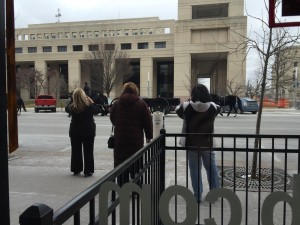I was at lunch, my table next to a window overlooking a busy city street. I had ordered my meal, I was sipping hot tea, I was spending time with a new client who wants to use history to improve his leadership. Then, close to us, I heard the sound of cannon firing, another, and another. Looking out the window, I see the sight you see in the photo above (which I took on my phone). Look closely at what I saw–black horses, black coffin, black wagon. The echoes of the cannon shots faded away.
This was a strange feeling.
The immediate description I’ll share with you was the photo captured part of the ceremony honoring a former governor who had died at age 96.
More important, though, something that I think has frankly greater impact, is my reaction in the moment:
It was organic, unlike any other such instance I can recall.
What I’m trying to say is that the event felt totally connected to me as a person. I turned around from my seat and lived the thing as it was unfolding. I wasn’t there by plan–not like when you go to the Fourth of July to hear the celebration, not like when you stand on the sidewalk in your spot to watch the parade, not like you prepare to listen to a eulogy or other form of speech, not like wearing a particular set of clothes that mark the occasion or project the time to arrive, to be there, and then to leave. None of that was true. I was simply there, looked up, and for a ticking of seconds that grew to a few minutes, grabbed hold of the event. Like breathing, the feeling was one of the most natural senses I’ve ever had.
A person who died was a formal leader of a place where I live and have lived. People who were and are important to me knew who he was. Sometimes, they liked him. Other times, they didn’t. Both he and they are no longer alive. And now, all of him and them were back in front of me. I was part of it then and in these minutes embedded in the photo, I was part of it once more. Rooted, growing, living, and dying. An orange flame, a green plant, ashes and dust. Organic.
I often urge people to think about the difference between the past and history. The past is everything that has happened. History is the product of what we glean, remember, recall, and believe.
Maybe the power of the moment I felt comes from the point where the two are still joined.








